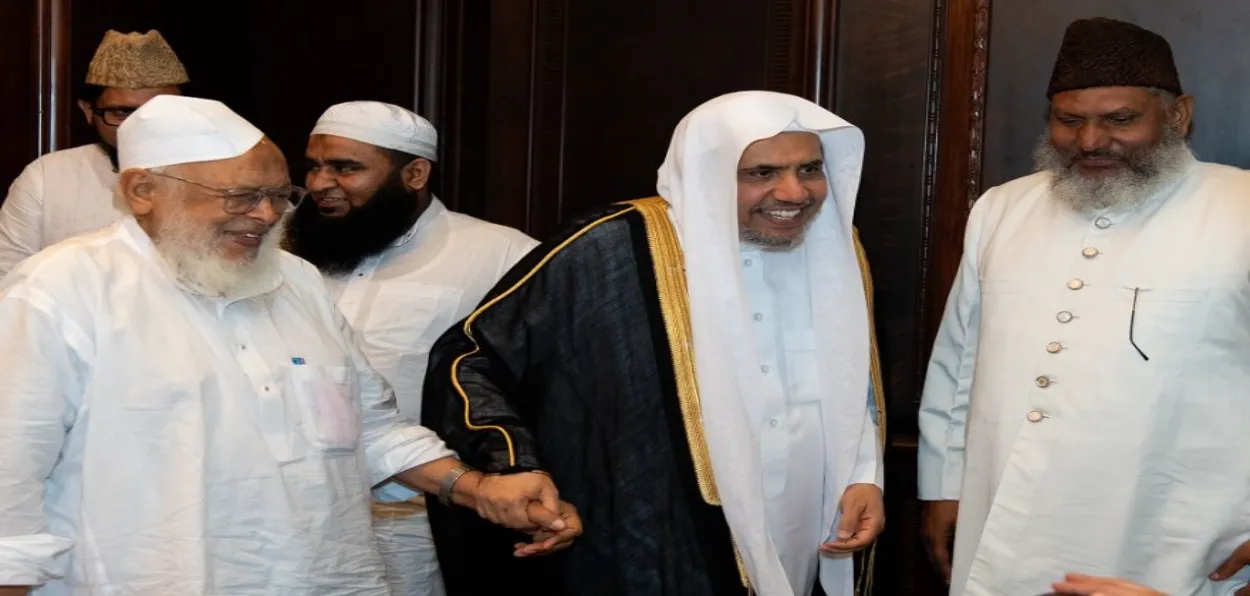
Shujaat Ali Quadri
India in the last year saw two pivotal religious activities. One saw an assembly of Indian and Indonesian Ulema (scholars) deliberating upon fomenting interfaith dialogue. The second was the visit of Sheikh Mohammed Abdul Karim al-Issa who is chief of the Saudi-based World Muslim League and was on a similar mission. Both series of events left behind a trail of reformist paths that Indian Ulama had to urgently follow.
Why are there lessons for Indian Ulama? First, despite India being safe from extreme radical thoughts expounded by groups like the Islamic State of Iraq and Syria (ISIS) and like-minded groups, the threat persists as these groups are active in India’s immediate neighbourhood. Second, the rapid advance of democratic thoughts and technological advancement have left no choice but swiftly accommodating to the new environment.
India and Indonesia have two of the largest Muslim populations in the world, around 200 million each. Religious activities of such a large mass of people leave a lasting impression about Islam and its role in world politics. Both these countries have deep histories of religious diversity and thus the emphasis on the democratic principles of peaceful coexistence and harmony naturally becomes expedient.
Indonesia, like India, faced the danger of religious extremism only a few years back. The infamous Bali bombing is a grim reminder of that immediate past. However, the Indonesian government came up with a solution through Nahdlatul Ulama — a traditionalist organization with an estimated membership of over 95 million — to promote globally the notion of Islam Nusantara (Islam of the Indonesian Archipelago). Founded in 1926 by the Ulama and merchants to defend both traditionalist Islamic practices (by Shafi’i school) and its members’ economic interests, the organization has today become a fountain of religious reforms and people-oriented poverty alleviation programmes.
What is particularly unique in the Indonesian understanding of Islam is that it combines the religious teachings with the local context. This essentially means that the principles of Islam can be adapted to the context in any case and this makes it easier to apply the teachings rather than having a rigid interpretation of the religion. This rigid interpretation essentially becomes a breeding ground for radicalization and religious extremism. The new coinage that the Nahdlatul Ulama has invented is “humanitarian Islam” which appeals to every section of the society and embraces everyone simply as fellow human beings.
Besides preaching Islamic values, the Nahdlatul Ulama undertakes educational activities through its network of 6,830 Islamic boarding schools (or pesantren). It also owns 44 universities; is involved in economic and agricultural studies; and provides social services such as family planning. In 2019, it called for the abolishment of the term “kafir” to describe non-Muslims.
In extending a hand of support and cooperation to Indonesia, India aims to bring this ideology of ‘moderate Islam’ to the forefront. Indian ulama have to take cues from the NU and employ themselves in educational activities. They must come up with a mutually agreed charter to make reforms on within the line. Besides, they all have to take initiatives on their own for madrasa reforms or welcome the government's steps in this direction. More importantly, they have to shun any “theory of distance from non-Muslims” if it exists in Muslim society.
Like Nahdlatul Ulama, the Jeddah-based World Muslim League, which has a wide network among Muslims around the globe, has illustrated how reforms can be bravely launched. The MWL, under Dr. al-Issa, has demonstrated exemplary courage in shunning several religious texts that somehow sowed seeds of discord or were vague in their interpretations. This has been done with the backing of Saudi Crown Prince Mohammed Bin Salman who seems to have a clear vision of reform-oriented Saudi Arabia which he is set to rule after his father King Salman bin Abdul Aziz.
The Saudi royal family had hitherto followed and promoted Wahhabism and granted the movement authority over education and public morality. The hardline doctrinaire movement is slowly being blunted edge by edge, making it more accommodating of other viewpoints and changing circumstances.
The MWL, under Dr. al-Issa, is known for its moderation and a fervent search for world peace. During his India visit, he asked Indian scholars to purge “toxic literature” (meaning that promotes disharmony and discord) and make reforms in religious textbooks. He also called India an ideal democracy and a perfect place for Muslims to live in.
Now, the onus is on Indian Ulama to take quick cues from examples of Nahdlatul Ulama and the MWL which have daringly established themselves as a harbinger of change in Muslim thoughts and practices. The Indian Ulama have to show similar courage and embark on a reformist road without wasting any precious time.
The lead should ideally be taken by leading seminaries and Ulama. They have hogged all the limelight so far and thus must be the vanguard of change as well. Time is knocking at their doors.
(Dr Shujaat Ali Quadri is the Chairman of the Muslim Students Organisation of India)
